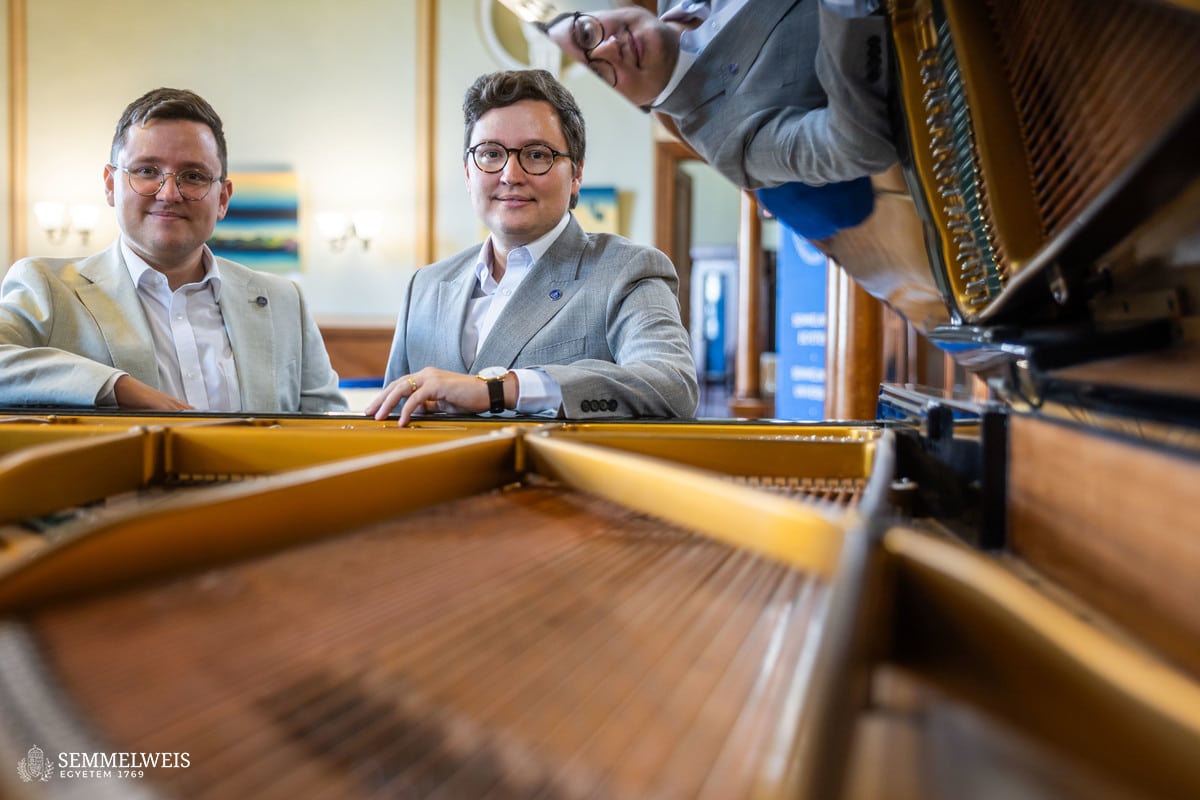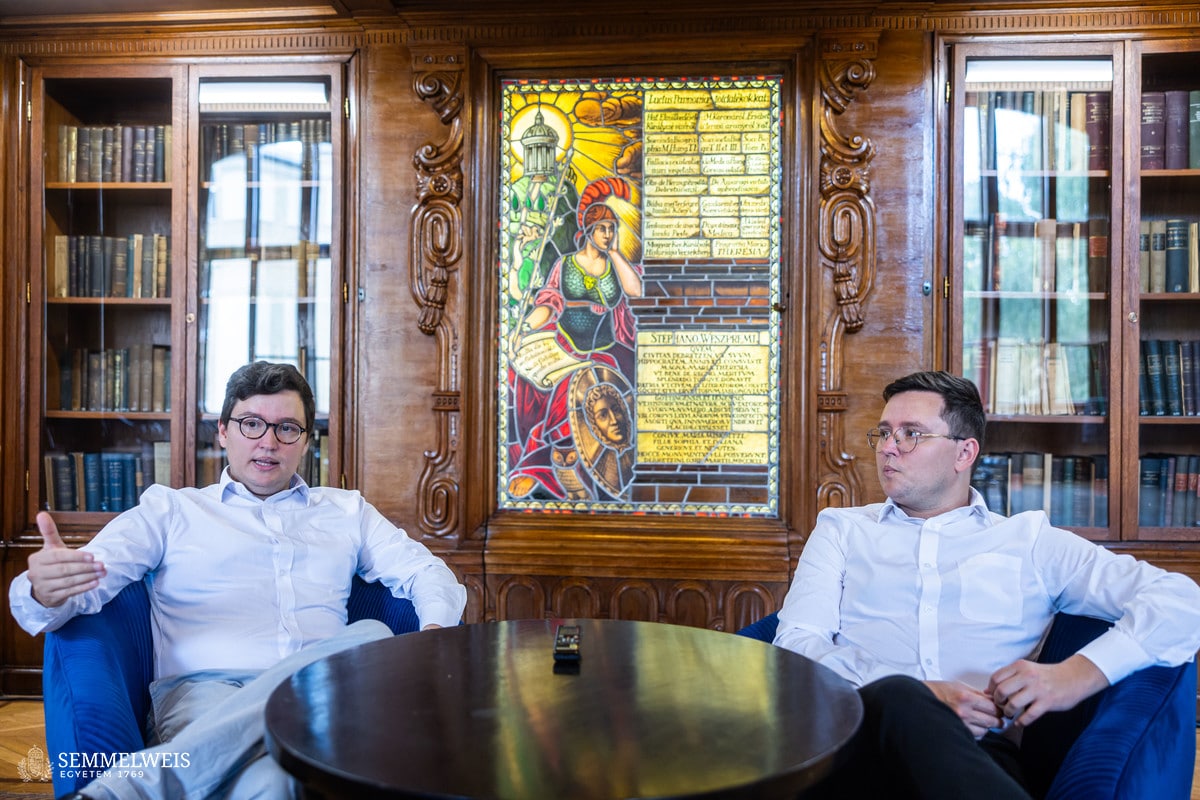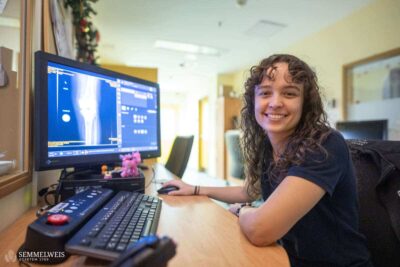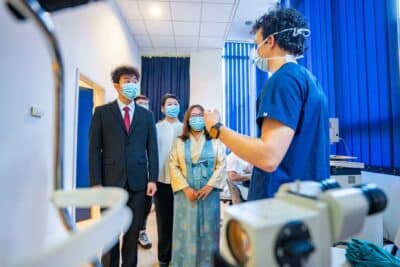György Vukán, recipient of the Kossuth, Ferenc Erkel, and Béla Balázs Prizes, is known to everyone as a jazz pianist and composer, but he also worked as a dentist at Semmelweis and had his own dental patent; Ervin Lukács, Kossuth and Franz Liszt awardee, also studied at Semmelweis. Then there is the Semmelweis String Quartet, whose members were all doctors who performed with the greatest Hungarian musicians; or the Semmelweis Chamber Orchestra, which includes both doctors and Opera House musicians among its ranks – these are some of the examples Dr. Gergely and Zsombor Tóth-Vajna mention to show that medicine and music can indeed coexist. However, it is rare for someone to pursue both activities at such a high level of intensity, given that each one requires a person’s full commitment. Nevertheless, the Tóth-Vajna twins have achieved similar success in both their careers.
They graduated from Semmelweis University’s Faculty of Medicine (ÁOK). Gergely then began working at the Pediatric Center, passing his pediatric and radiology specialist exams. After this, he left the university for a short time to work at the Károly Tormay Health Center. However, as the institution became part of the university as of September 1 and continues to operate under the name Semmelweis Health Center, Gödöllő, he in fact returned to Semmelweis. Zsombor passed a specialist exam in occupational medicine; they conducted their joint PhD research at the Városmajor Heart and Vascular Center and the Institute of Behavioral Sciences, and both have degrees from music schools in Budapest, Amsterdam, and London. They are currently researchers at the Royal College of Music in London. On March 15 this year, both were awarded the Franz Liszt Prize.
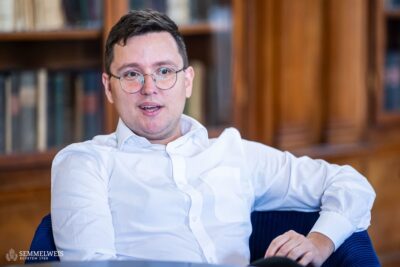 The interest in medicine and healthcare runs in the family: Their mother is a pediatrician and their father is a pediatric surgeon, radiologist, and isotope specialist – both graduated from Semmelweis University and even met on their first day at university. Additionally, there have always been doctors in their mother’s family, going back generations. Although they were born and raised in the northeastern city of Miskolc, there was no question that they would choose Semmelweis University as the place to study medicine. Opting for a career in music was less obvious: At home, they preferred the rock band Omega to classical music, and it was only their cousins in the family who learned to play the piano. Since they did not have such an instrument, they both started playing the recorder first. They soon received an antique piano, which, according to their recollections, sparked their interest in music. “This happened around fifth or sixth grade, so we were latecomers compared to other musicians. We initially thought it would be a great hobby, but it ended up becoming something more serious,” Zsombor recalled. “Since our parents weren’t musicians, we didn’t feel that kind of pressure,” Gergely added.
The interest in medicine and healthcare runs in the family: Their mother is a pediatrician and their father is a pediatric surgeon, radiologist, and isotope specialist – both graduated from Semmelweis University and even met on their first day at university. Additionally, there have always been doctors in their mother’s family, going back generations. Although they were born and raised in the northeastern city of Miskolc, there was no question that they would choose Semmelweis University as the place to study medicine. Opting for a career in music was less obvious: At home, they preferred the rock band Omega to classical music, and it was only their cousins in the family who learned to play the piano. Since they did not have such an instrument, they both started playing the recorder first. They soon received an antique piano, which, according to their recollections, sparked their interest in music. “This happened around fifth or sixth grade, so we were latecomers compared to other musicians. We initially thought it would be a great hobby, but it ended up becoming something more serious,” Zsombor recalled. “Since our parents weren’t musicians, we didn’t feel that kind of pressure,” Gergely added.
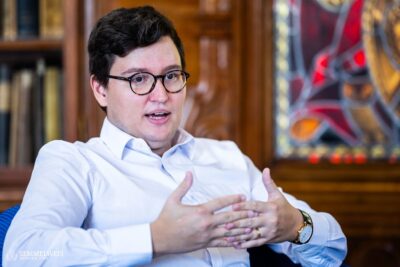 They attended music school alongside elementary school, and this duality continued later on: While studying at high school, they also completed the organ program at the Béla Bartók Secondary School of Music and Dance in Miskolc. “We had already performed many times, but our parents, who were doctors, insisted that we have another occupation besides music. ‘There’s always a need for doctors,’ they used to say. During the COVID pandemic, we had to admit that they were right: All our concerts were canceled, but as doctors, we were able to continue working, and in fact, we were needed more than ever before. That’s when we realized that while doctors heal the body, musicians heal the soul. And when someone does both, they can achieve harmony between the two,” Gergely pointed out.
They attended music school alongside elementary school, and this duality continued later on: While studying at high school, they also completed the organ program at the Béla Bartók Secondary School of Music and Dance in Miskolc. “We had already performed many times, but our parents, who were doctors, insisted that we have another occupation besides music. ‘There’s always a need for doctors,’ they used to say. During the COVID pandemic, we had to admit that they were right: All our concerts were canceled, but as doctors, we were able to continue working, and in fact, we were needed more than ever before. That’s when we realized that while doctors heal the body, musicians heal the soul. And when someone does both, they can achieve harmony between the two,” Gergely pointed out.
Semmelweis University supported not only their medical studies, but also their musical careers. They joined the Ödön Kerpel-Fronius Talent Development Program as freshmen in 2008. The program aims to bring together students who are exceptionally talented in other areas in addition to their medical studies. Kerpel is a meeting place for talented young people, as evidenced by the fact that the university’s first classical music album, Medical Students at the Piano, was recorded with the participation of Kerpel students, they pointed out.
Dr. Péter Csermely, professor at the Department of Molecular Biology, recommended the program to them after seeing a photo posted by Zsombor on social media of him playing one of Handel’s organ concertos during a summer course. As they said, they still maintained close ties with the talent development program. Their former mentors, Dr. Attila Szabó, Vice-Rector for Clinical Affairs, and Dr. Alán Alpár, Vice-Rector for International Studies, attended several of their performances. The twins also returned to play music at a Kerpel program event this year.
On December 4 last year, we gave a concert at concert hall Müpa Budapest, and the university’s professors were well represented in the audience, they noted proudly.
However, the Kerpel program had a positive impact on more than just their musical careers. “I had a hard time deciding which direction to take in medicine. I remember we were at a Kerpel event, where I told professors Attila Szabó and György Fekete about my doubts, that I liked pediatrics, but I was unsure. They gathered around me and began listing all the wonderful things about pediatrics: children’s dedication to recovery, and the fact that pediatricians always remain a little bit like children at heart. This had such an impact on me that I decided to become a pediatrician – however, I remained enthusiastic about radiology as well, so I went on to take my specialist exam in that field, too,” said Gergely. Zsombor began his PhD studies in vascular surgery and angiology but eventually switched to occupational medicine at the suggestion of his supervisor, Dr. Péter Sótonyi Jr., because he felt that this would allow him to continue pursuing music. By then, they had both decided that they did not want to give up any of their professions at the expense of the other. According to Gergely, after a difficult day full of complicated cases, it was a huge help for him to be able to sit down and play his instrument, as it engaged a completely different part of his brain. In contrast, Zsombor emphasized the similarities between the two activities: Both require a great deal of mechanically repetitive practice, as this is the only way to consolidate the necessary knowledge and reflexes. However, they agree that, although medicine always involves working with and for others, playing and practicing an instrument is mostly a solitary pursuit. This is why they both started conducting, which involves instruction and the interplay of instruments.
After obtaining their medical PhDs, both of them aimed to obtain doctoral degrees in music as well. Zsombor completed his master’s degree in music in Amsterdam, while Gergely studied at the world’s leading conservatory, the Royal College of Music in London, where they both eventually went on to complete their doctoral studies. “Doctor of Music is a very special and archaic doctoral title that can only be awarded by the Royal College of Music as the leading music education institution. Unlike a traditional PhD, this program requires not only research but also the compilation of a high-quality portfolio of musical performances. The committee evaluates this portfolio together with the scholarly publication,” they revealed. They added that theirs was the last class and that, in the future, only Doctor of Philosophy programs would be available. Gergely’s research topic is the birth of the early piano, and Zsombor’s is English Baroque organ music from the late 17th century. Both topics primarily connect them to London. In addition, Gergely now practices as a pediatrician at the Semmelweis Health Center, Gödöllő, which is affiliated with the university, while Zsombor works as a school physician at the Zugló Health Service in Budapest.
On the occasion of this year’s March 15 national holiday, they received the Franz Liszt Prize, the highest musical distinction that can be bestowed by the Hungarian state. This was the first time in the history of the award that it was shared by siblings. Gergely described receiving the prize in the Vigadó of Pest as one of the defining moments of his life. “The road to getting here wasn’t easy. We were often told that we might be good doctors, but that we were first and foremost musicians. In the music world, on the other hand, they used to say that we might be good musicians, but we were actually doctors. We always felt that we had to work extra hard in both fields to be recognized,” he explained. He added that winning the Liszt Prize meant that they would finally no longer have to prove their talent.
Gergely considers it a similarly defining moment when he and his brother were able to perform at Westminster Abbey, preceded by a Friday evening session when the legendary church was theirs alone, where they had the opportunity to practice under two spotlights. Speaking of the same occasion, Zsombor highlighted the bow after the concert, when he felt that they too had become a very small part of the building’s history, but he also considers it important that he and his fellow students were able to perform for Queen Elizabeth II at Buckingham Palace.
Of course, they also have similar defining memories from their medical careers: Both are very proud of their specialist exams, and they are always touched when they meet someone who knows them as musicians as well. “We usually say that this is when we get caught,” they commented with a smile. Gergely particularly remembers when, during a weekend shift at the Bókay Street Department of the Pediatric Center a parent told him that his four-year-old daughter would immediately start shouting, ‘The doctor is there!’ whenever she saw him on the TV show Hangvilla (‘Tuning Fork’) on the public broadcaster M5. Zsombor had a similar experience when someone visited him for an occupational medicine examination and revealed that they had been looking forward to it and were excited about it, as they had been to several of his concerts.
Speaking of their future plans, they noted that the Franz Liszt Prize would allow them to give concerts in the coming years that they could perform with love and enthusiasm – their big dream, for example, was to perform at Carnegie Hall in New York. They are eager to continue playing music with joy and excitement, while remaining equally committed to their medical careers. Gergely now wants to play an active role in university life at Semmelweis, in terms of teaching, research, and patient care, while Zsombor’s goal is to become a Semmelweis Citizen again, as he feels he misses the Semmelweis Family.
Ádám Szabó
Translation: Judit Szabados-Dőtsch
Photos by Bálint Barta – Semmelweis University
